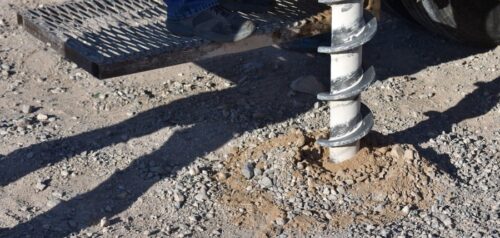Colorado Soil Test
If you are a homeowner or a gardener in Colorado, you might have noticed that the soil quality in the state is unique and requires special attention. Understanding how to properly test and care for Colorado soil can be a challenge, but it's essential for the health of your plants and the success of your landscaping projects.
Challenges with Colorado Soil Test
There are various challenges associated with Colorado soil testing. For starters, the soil in Colorado is often high in alkaline and has a higher pH value compared to the soil in other states. Additionally, Colorado soil can be dense and compact, making it difficult to absorb water and nutrients and affecting the growth of plants. Soil erosion is also a common issue in the state due to its arid and windy climate, which can result in nutrient depletion and soil degradation.
Target of Colorado Soil Test
The target of Colorado soil testing is to determine the properties and characteristics of the soil in your specific location. Soil testing can provide valuable information such as the soil pH level, nutrient deficiencies, and the presence of potentially harmful elements such as lead and arsenic. This information can help you determine what kind of fertilizer or soil amendment to use to improve the soil quality and ensure optimal plant growth.
Summary of Main Points
Colorado soil testing is crucial for anyone who wants to maintain a healthy garden or landscape in the state. Testing can help identify soil deficiencies, nutrient imbalances, and other issues that can impact plant health. The unique challenges of Colorado soil, such as its alkaline content and density, require careful attention and adjustment in order to ensure optimal growing conditions.
The Importance of Colorado Soil Testing
At our farm in Colorado, we have experienced the unique challenges of Colorado soil firsthand. The compact nature of the soil and its high alkaline content made it difficult for our plants to absorb nutrients and grow to their full potential. After conducting a soil test, we were able to identify the specific deficiencies and adjust our fertilizer and amendment use accordingly. The results were transformative, and our plants grew stronger, taller, and produced healthier yields.
Colorado soil testing is essential for anyone who wants to ensure optimal plant health and garden success. By providing a clearer picture of soil deficiencies, nutrient imbalances, and other issues, soil testing can help you make informed decisions about fertilizer and amendment use, watering schedules, and other factors that can impact plant growth.
Understanding Soil Amendments
Soil amendments are substances that are added to the soil to improve its quality and provide essential nutrients to the plants. In Colorado, soil amendments are often used to counteract the alkaline nature of the soil and lower its pH level. Common soil amendments include sulfur, peat moss, compost, and manure. These amendments can help improve soil structure, retain moisture, and promote microbial activity, all of which can contribute to healthier plant growth.
Importance of Fertilizing Colorado Soil
In addition to soil amendments, fertilization is also essential for healthy plant growth in Colorado. Plants in the state often require specific nutrients such as nitrogen, potassium, and phosphorus, which can be lacking in the alkaline soil. Fertilizers can help supplement these nutrients and ensure that plants have access to the building blocks they need to grow strong and healthy.
Question and Answer Section
What is the best time to conduct a soil test in Colorado?
The best time to conduct a soil test in Colorado is typically in the fall or early spring before planting. This gives you enough time to adjust your soil quality before planting new plants.
Can I perform my own soil test in Colorado?
Yes, you can perform your own soil test using at-home kits available at most garden centers and online. However, professional soil testing services provide more accurate and in-depth analysis of your soil, which can be critical for optimal plant growth.
What kind of fertilizer is best for Colorado soil?
The best type of fertilizer for Colorado soil depends on your specific soil deficiencies and plant needs. Common fertilizer types include nitrogen-based fertilizers, phosphorus-based fertilizers, and potassium-based fertilizers. It's important to choose a fertilizer that is appropriate for your specific soil needs and plant type.
What are common signs that my soil needs testing in Colorado?
Some common signs that your soil may need testing in Colorado include slow plant growth, yellowing foliage, soil erosion, and nutrient deficiencies. If you notice any of these signs, it's important to test your soil to identify the underlying issue and ensure optimal plant growth.
Conclusion of Colorado Soil Test
Colorado soil testing can be challenging, but it's essential for maintaining healthy plants and landscapes in the state. Understanding the unique challenges of Colorado soil, such as its high pH and density, and adjusting your amendments and fertilizer usage accordingly can promote optimal plant growth and ensure the success of your gardening or landscaping projects.
Gallery
What You Need To Know About Colorado Soils - Thomas Sattler Homes

Photo Credit by: bing.com / construction soils
Why Is Colorado Soil So Compact? - Revive Lawn Care Products

Photo Credit by: bing.com / revive properly
Expansive Soils In Colorado And How Best To Deal With Them - EVstudio

Photo Credit by: bing.com / expansive soils risks evstudio bedrock underrated swelling swell
Soil Testing - Denver County Extension

Photo Credit by: bing.com / soil testing denver extension laboratory colorado plant university state water
Soil Testing | EcoTurf Of Northern Colorado

Photo Credit by: bing.com / soil testing agriculture careers forestry microscope lawn some tests environmentalscience inspection under